News
Milking Added Value Options for Beverages
28 Oct 2014Many sources have highlighted dairy beverages as a key growth market for the future and certainly the soft drinks industry seems to think so, with Coca-Cola recently identifying value-added dairy as a top target for still beverage retail growth to 2020. The company has already entered the category with its partnership with Select Milk Producers […]

Many sources have highlighted dairy beverages as a key growth market for the future and certainly the soft drinks industry seems to think so, with Coca-Cola recently identifying value-added dairy as a top target for still beverage retail growth to 2020. The company has already entered the category with its partnership with Select Milk Producers to produce and distribute the Core Power protein-rich dairy-based sports recovery beverage, seen by many as a first step to creating a value-added nutritional dairy portfolio to run alongside its traditional carbonated and still soft drinks business.

Opportunities for innovation can be relatively limited in milk and milk drinks in comparison with some dairy categories such as yogurt. In the dairy beverages market, milk itself is focusing on quality, purity, health and naturalness to drive new product activity and sales.
Nearly 70% of milk and milk drinks launches recorded by Innova Market Insights over the 12 months to the end of September 2014 carried a health positioning of some kind, led by low-fat claims used on over 40%. Other areas of ongoing interest in terms of claims included natural/organic/GM-free, lactose-free and protein content. Nearly 14% of launches used natural or organic claims, or both, while 10% used protein-related claims and 5.6% were marketed as lactose-free. Over 2% of launches used GMO-free claims, double the percentage of a year previously and despite the fact that GMO labelling is already compulsory in many countries.

Many flavoured milks are also adding value with one or more of these health benefits and the dairy beverages market is also seeing considerable activity in products such as dairy-based coffee drinks, liquid breakfasts, drinkable yogurts, and performance beverages, including high-protein products.
Ready-to-drink (RTD) or iced coffee has been seeing particularly strong product and market activity in recent years, although it remains one of the smallest sectors of the soft drinks market in terms of new product activity, accounting for just 4% of global launches recorded by Innova Market Insights in the 12 months to the end of September 2014. This is up from less than 2.5% five years ago, however, and the actual number of launches has more than trebled over that period.

While ambient canned and bottled coffee drinks continue to dominate globally, particularly in well-established markets such as those in parts of Asia and the US, it is the chilled milk-based variants in lidded cups suitable for on-the-go consumption that have been leading growth, particularly in the relatively undeveloped European market.
The market has been further boosted in recent months with the arrival of some leading hot coffee brands with their own milk-rich ready-to-drink products in lidded cups. These include Mondelez’s market-leading Jacobs brand in Germany and Nescafe, which launched its Shakissimo range across a number of European markets.

From the level of interest from key multinationals and brands already well-established in other areas of the beverage market, it seems that value-added dairy is regarded as a promising area for the future and we can await a succession of further developments from new and established players.
Related news

UK to ban junk food TV advertisements before 9pm
3 Oct 2024
In a bid to reduce childhood obesity, the UK government has introduced a policy, coming into effect on 1 October 2025, banning junk food advertising on television before the 9pm watershed.
Read more
Which food and beverage brands made TIME’s Most Influential Companies list?
2 Oct 2024
Chickpea pasta, prebiotic sodas, food boxes, non-alcoholic beer, and a soil carbon marketplace are the specialties of the five food and beverage brands that earned a spot on TIME’s 2024 list.
Read more
New environmental food scoring standards emerge
30 Sep 2024
EIT Food and Foundation Earth collaborate to launch environmental food scoring for products entering the global supply chain.
Read more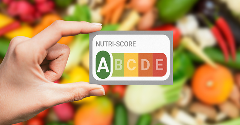
Danone removes NutriScore from products
20 Sep 2024
Following an algorithm update that gives some of its sweetened drinks a worse score, Danone has removed the front-of-pack label, NutriScore, from all of its products – putting profit before public health, say campaigners.
Read more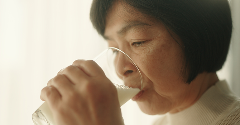
Nestlé develops a new fat reduction method for dairy ingredients
26 Aug 2024
A Brazil-based Nestlé research and development team has developed a way to reduce the fat in milk powder by as much as 60%, without impacting the key characteristics that consumers enjoy.
Read more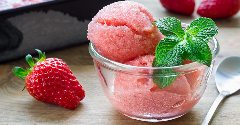
Better Juice expands its range to sorbets
16 Aug 2024
Food tech startup Better Juice has developed a technology to reduce the sugar content in fruit sorbets. The process retains the natural vitamins, minerals, and flavours of fruit, while offering manufacturers an easy-to-implement and scalable solution t...
Read more
German study reveals high sugar, fat, and salt levels in children's foods
13 Aug 2024
The food industry is making slow progress in reducing the high levels of sugar, fat, and salt in German food and beverage products marketed to children, according to the Max Rubner Institute (MRI).
Read more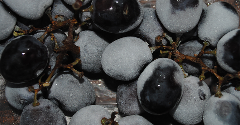
Swedish court overturns prohibition on winery’s use of imported frozen grapes
12 Aug 2024
Swedish company Drood Winery has successfully challenged the Swedish Food Agency’s decision to prohibit the production and sale of their product made from frozen grapes imported from Iran.
Read more
Paris Olympics: Food and beverage brands champion health, fun, and sustainability
5 Aug 2024
Food and beverage brands are aligning with the Paris Olympics 2024 Food Vision, which emphasises sustainability, local sourcing, and plant-based diets.
Read more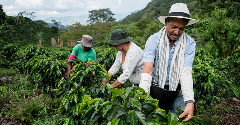
The coffee supply chain is failing farmers, says Solidaridad
30 Jul 2024
The coffee industry’s economic model means its profits do not reach farmers, despite there being enough value to be shared all along the supply chain, according to a new report by Solidaridad Network and IDH.
Read more